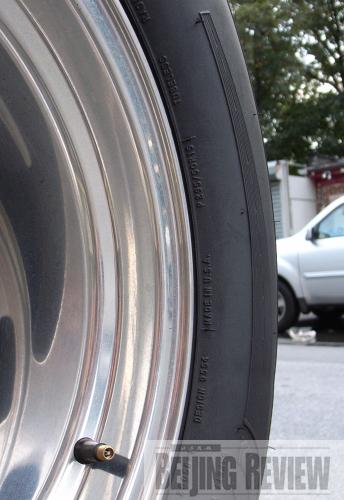|
 |
|
READY TO ROLL: This photo shows a U.S.-made Cooper tire on a SUV parked in a New York City street on September 13. The majority of American-made vehicles still adopt U.S.-made tires, and China-made tires mainly go to the after-sale service market in the United States (LIU XIN) |
On September 11, U.S. President Barack Obama decided to launch punitive tariffs on China-made tires. The tariffs were set at 35 percent in the first year, 30 percent in the second and 25 percent in the third—as opposed to the current rate of 3.4 percent to 4 percent.
"China strongly opposes the grave act of trade protectionism by the U.S. side," Chinese Minister of Commerce Chen Deming told Xinhua News Agency immediately after Obama's decision, "which not only breached World Trade Organization (WTO) rules, but also broke the U.S. pledges made at the G20 summit in London in April."
Chen added that the U.S. side had abused special safeguard measures and sent the wrong message to the rest of the world.
In recent months, he added, the two sides had discussed the tariffs on Chinese tires on different levels, but failed to reach a consensus because of the high U.S. charges.
After voicing deep regret, he noted this "grave protectionist behavior" would damage not just Sino-U.S. trade and economic relationship, but general bilateral interests as well.
Chen said the Chinese Government would continue to protect the legal rights of domestic companies and help them cope with the difficulties resulting from the tariff hike, while reserving its right to take further actions and measures.
A wrong decision
The United Steelworkers union filed a petition against China-made tires to the U.S. International Trade Commission (ITC) on April 20. Two months later, the ITC suggested President Obama impose a 55-percent tariff on passenger car and light truck tires imported from China, which could be reduced to 45 percent in the second year, and 35 percent in the third before being removed.
On September 3, the Office of the U.S. Trade Representative submitted the case to the White House. It was the Obama administration's first special safeguard investigation aimed at China.
The Chinese Government had been keeping close attention to the case ever since April, the Chinese Ministry of Commerce (MOFCOM) said in a news release posted on its website on September 12.
During the past five months, MOFCOM, the Ministry of Foreign Affairs and Beijing's diplomats in the U.S. continuously lobbied the U.S. Government, the release said. At the same time, they tried to promote communication between the two countries' industrial associations and companies, fully stating China's stances and concerns.
Their efforts got support and understanding from related industries in the United States, MOFCOM said.
China demonstrated flexibility and sincerity in solving problems during the inter-governmental negotiations, it said. But the U.S. side, due to domestic political pressures, insisted on unreasonable requests besides tires, which concerned many other industries. It even mandated that China adjust its financial and tariff policies.
These demands, according to MOFCOM, were unacceptable to China.
There was no essential evidence for the U.S. side to impose such a tariff standard, it said, while stressing a number of points:
First, China-made tires have not shown clear export increases to the United States since 2007. The export volume of 2008 only grew 2.2 percent over 2007, for example. During the first half of 2009, on the other hand, the volume even decreased 16 percent from the same period last year.
Second, China-made tires mainly go to the U.S. after-sale service market. U.S.-made tires, however, are sold immediately to U.S. car manufacturers. Rather, there is no direct competition between them.
Third, the conditions of the U.S. tire industry have not taken on obvious changes after Chinese products entered the U.S. market. Even in 2007, the year China-made tires realized the biggest export increase, the U.S. tire industry continued to generate outstanding profits.
Fourth, some tire manufacturing plants and facilities in the United States have been closed because of a structural adjustment for choosing a high-end market—not because of imports from China.
Moreover, even if the United States stops importing China-made tires altogether, it will still have to import low-end tires from other countries.
MOFCOM spokesman Yao Jian said that China had held several rounds of negotiations with U.S. representatives over the issue but the Americans refused to back down. This harsh trade protectionism has left Beijing strongly dissatisfied.
Economic fallout
The United States is the second largest destination for Chinese exports, while China is the third largest destination of U.S. exports. In fact, since 2002, China has been a principal U.S. market that has seen the fastest export growth.
Yao warned that the tire case would hurt U.S. interests, too. For one thing, there are four U.S. tire manufacturers in China, which take up two thirds of China's total tire exports to the United States. Added tariffs would directly hurt the interests of these U.S. companies, Yao said.
Instead of helping address the unemployment of American workers in the tire manufacturing sector, imposing high tariffs on China-made tires would negatively affect the employment of 100,000 Americans involved in importing and selling Chinese tires.
| 